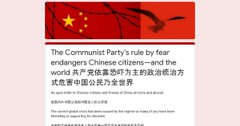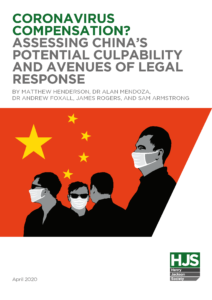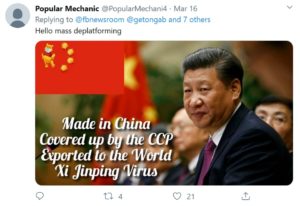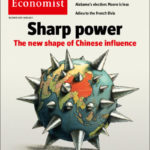A journalist who had worked for some of China’s most powerful propaganda outlets has been jailed for 15 years after being accused of attacking the ruling Communist Party, AFP reports:
Chen Jieren was convicted on Thursday (April 30) of “picking quarrels and provoking trouble, extortion, illegal business operations and bribery”, a court in central Hunan province said in a statement posted online…..The Chinese Human Rights Defenders watchdog said Chen’s conviction was “apparently to punish him for his political speech on WeChat and other social media platforms”, calling for his immediate and unconditional release.
Censuring other parties for dissenting opinions is nothing new for Chinese government spokespeople and state media, notes analyst Jo Kim. Still, China has lately been stepping up its effort to counter global criticisms of its government for the outbreak of COVID-19, causing its propaganda efforts to backfire.
 In the absence of clarity and a rash of misinformation, the COVID-19 pandemic has created a breeding ground for prejudice against minority groups across the globe. This isn’t entirely unexpected. A 2019 Harvard study found a correlation between infectious disease rates and explicit racial prejudice, the NED-supported Poynter Institute* reports.
In the absence of clarity and a rash of misinformation, the COVID-19 pandemic has created a breeding ground for prejudice against minority groups across the globe. This isn’t entirely unexpected. A 2019 Harvard study found a correlation between infectious disease rates and explicit racial prejudice, the NED-supported Poynter Institute* reports.
“If you’re living in a region with higher infectious diseases…you’re going to see more intergroup tensions and racial prejudice occur in these kind of environments,” researcher Brian O’Shea told NPR’s Shankar Vedantam.
 What makes the current pandemic more dangerous than any before is that the spread of rumors and false information on the internet is even faster than that of the coronavirus itself, according to Elmie Nekmat and Audrey Yue of the National University of Singapore Centre for Trusted Internet and Community.
What makes the current pandemic more dangerous than any before is that the spread of rumors and false information on the internet is even faster than that of the coronavirus itself, according to Elmie Nekmat and Audrey Yue of the National University of Singapore Centre for Trusted Internet and Community.
“Insidious confusion” caused by the fact that disinformation on the coronavirus is “mutating and spreading faster than the virus outbreak itself” – coupled with an avalanche of user-generated content on social media – obfuscates critical information, stimulates speculation and fearmongering, and makes finding the truth seem impossible, they write for the World Economic Forum. As a flight to safety, this state of informational disarray has led to people becoming more reliant on mainstream news organizations and authoritative sources for accurate information.
 Global concerns over China’s censorship of the pandemic can be grouped into two categories that seem to be ‘schizophrenic’ but are related, notes Joy Yueyue Zhang, Senior Lecturer in Sociology at the University of Kent:
Global concerns over China’s censorship of the pandemic can be grouped into two categories that seem to be ‘schizophrenic’ but are related, notes Joy Yueyue Zhang, Senior Lecturer in Sociology at the University of Kent:
- On the one hand, there is skepticism over accepting China’s COVID-19 statistics for concerns that they are doctored to ‘save face’.
- On the other hand, the international community is simultaneously agonizing over the missed opportunities of engaging with Chinese data.
That is, there are concerns that in a time when global research collaboration is most needed, China, the country that accounts for 36% of the world’s scientific papers in the life sciences, and has the largest volume of data on COVID-19, would turn into a secretive operation, she writes for Open Democracy:
This later worry seemed to be further confirmed by a 13 April CNN report, which exposed that China has tightened its censorship over the publication of coronavirus research. In short, these two seemingly paradoxical concerns can be summarized in one sentence: Do we really know what China knows?
The European Union’s chief diplomat has denied watering down a coronavirus disinformation report critical of China. But European politicians are skeptical, with one telling the diplomat that his team had been “caught with their hand in the cookie jar,” the South China Morning Post reported:
On Thursday, the EU’s chief diplomat Josep Borrell told the European Parliament in Brussels that China had been trying to assert its influence on the report. But he said that was normal diplomacy, and the pressure hadn’t been successful.
Borrell had previously warned of a ‘global battle of narratives’ between autocratic and democratic interpretations of the pandemic.

Wikipedia
Speaking at a specially convened meeting of the European parliament’s foreign affairs committee, Borrell said the content and the timing of the European External Action Service’s public assessment on disinformation and the pandemic had been determined by the EEAS alone. “We have not bowed to anyone,” he said. “There was no watering down of our findings, however uncomfortable it could be.” the Guardian adds:
A brewing row deepened last week after the New York Times reported that EU officials had delayed, and then rewritten, a report after China tried to block its release. Borrell, a former Spanish foreign minister, suggested there was confusion about two separate reports – a confidential one intended for diplomats, and a second for the public that was released on Friday by the EU’s monitoring website, EU vs Disinfo.

Wikipedia
“There are two different publications,” he said. “Don’t make the mistake that the second one is the first one with a little bit of change.” He criticized MEPs for attaching more weight to an apparently disgruntled member of staff who had leaked emails to the Times.
“Please be serious … why a single leak of a single member of the staff presenting their own impressions is more important than the whole work of the people there and my personal political commitment. Don’t weak[en] the institution,” Borrell said.
 The Xi regime’s campaign to suppress Western reporting and commentary about its coronavirus record is escalating, the Post reports:
The Xi regime’s campaign to suppress Western reporting and commentary about its coronavirus record is escalating, the Post reports:
It recently expelled journalists from The Post, the New York Times and the Wall Street Journal. Its diplomats demanded a public statement by the German government praising its coronavirus management. Its ambassador in Australia threatened the country with an economic boycott if the government did not stop asking for an investigation of the origin and handling of covid-19 in China.
The response to such belligerence cannot be appeasement and censorship, it adds.
China’s growing influence in Hollywood is also giving cause for concern.
You know how TV networks inform viewers that a film has been altered for television? Why not notify viewers if a film has been changed to conform with Chinese propaganda? asks Jonah Goldberg. At the beginning or end of a movie, American audiences (sh)ould have to be informed: “This film has been altered to fit the demands of the Chinese Communist Party.”
*A partner of the National Endowment for Democracy (NED).







